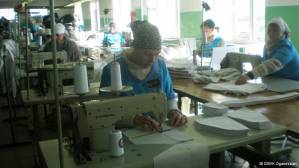Women behind bars in Ukraine

Human rights workers say that the conditions in women’s penitentiary institutions have somewhat improved over recent years but criticism is still due over medical care and social rehabilitation.
6% of prisoners in Ukraine are women. For several years the numbers were falling and the Penitentiary Service had been planning to close some of the women’s prison colonies, however the number has recently begun rising. Analysts believe this is a reflection of the 2008 economic crisis. Women are not often involved in robberies. The statistics show that the most common crime among women is murder or serious injury, usually in domestic conflicts.
Yulia, from the Zaporizhya oblast, has spent six years in the Pryazovsk Colony for murder. She has contracted tuberculosis in prison. She says that she had to seek medical help for eight months before they finally diagnosed her. She learned that she had tuberculosis only when the equipment which travels between different colonies appeared in hers.
The human rights organization Donetsk Memorial says that poor medical treatment is one of the main problems for female prisoners. Many leave prison with tuberculosis and a whole range of chronic illnesses.
Journalists shown a model prison colony
The Prymazovsk Corrective Colony which holds over 400 women prisoners is considered a model institution. Most of the prisoners are released early and the conditions are acceptable. The dormitories and recreation rooms are spartan but tidy; there is a school, library and sports fields. There are no guard dogs and the women can move freely around the territory of the colony which they themselves decorate with flowers. Oleksandr Bukalov from Donetsk Memorial says that the conditions in this colony are indeed reason which is why the Administration and the Penitentiary Service agreed to show it to journalists.
Mr Bukalov adds that the penal system has become more humane towards women. Even 15 years ago people were dying of hunger in prisons. Now international foundations are helping penitentiary services to create more or less normal conditions. NGOs do, however, complain that cooperation is as a rule confined to financial issues, and initiatives on human rights training for personnel are usually ignored.
If a prisoner writes to human rights workers with a complaint about the Administration, there is only about a one percent chance that the letter will get through, Oleksandr Bukalov says.
The most painful issue involves prisoners and their children. It is virtually impossible for mothers to have contact with children who are in a children’s home or school – orphanage (internat). This problem is in no way taken into account in legislation. Up till the age of three, a court can order that the children remain with their mother in an infants’ block attached to some colonies. Later they either go to children’s homes or school – orphanages. According to Mykhailo Matanhin from the relevant department of the Donetsk Regional Penitentiary Service, they tried to organize meetings between the mothers and children in a school – orphanage, “however there isn’t even enough money to organize such meetings.”
Work
The women at this colony have work and learn skills, which gives them hope of finding work when released, for example, in the sewing industry. However, Donetsk Memorial reports that they are paid a pitiful wage. On average in women’s colonies, the pay is around 300-400 UAH a month (less than 40 EUR). Mr Bukalov says that in order to determine whether the colonies could pay better, there would need to be access to financial documents. He complains of the colonies’ lack of transparency on financial matters.
Nonetheless, the work is of enormous importance since most of them do not have families waiting for them and need to be able to find a job. Mr Bukalov adds that the State services which should be helping women as a particularly vulnerable group fail to take their plight into consideration.





